Tag: workshops
Workshops for graduate students and early career researchers
The Library’s Office of Scholarly Communication Services is holding a series of workshops in October focused on publishing and professional development training for graduate students and early career researchers. All workshops will take place during the week of October 22 at the Graduate Professional Development Center, 309 Sproul Hall. Light refreshments will be served.
Copyright and Your Dissertation
Tuesday, October 23 | 1-2:30 p.m. | 309 Sproul Hall | RSVP
This workshop will provide you with a practical workflow for navigating copyright questions and legal considerations for your dissertation or thesis. Whether you’re just starting to write or you’re getting ready to file, you can use this workflow to figure out what you can use, what rights you have, and what it means to share your dissertation online.
From Dissertation to Book: Navigating the Publication Process
Wednesday, October 24 | 1-2:30 p.m. | 309 Sproul Hall | RSVP
Hear from a panel of experts – an acquisitions editor, a first-time author, and an author rights expert – about the process of turning your dissertation into a book. You’ll come away from this panel discussion with practical advice about revising your dissertation, writing a book proposal, approaching editors, signing your first contract, and navigating the peer review and publication process.
Managing and Maximizing Your Scholarly Impact
Friday, October 26 | 1-2:30 p.m. | 309 Sproul Hall | RSVP
This workshop will provide you with practical strategies and tips for promoting your scholarship, increasing your citations, and monitoring your success. You’ll also learn how to understand metrics, use scholarly networking tools, evaluate journals and publishing options, and take advantage of funding opportunities for Open Access scholarship.
UC Berkeley celebrates Love Data Week with great talks and tips!
Kicking off #lovedata18 week @UCBerkeley wih a workshop about @Scopus API! @UCBIDS @UCBerkeleyLib pic.twitter.com/qnXbQp7a9j
— Yasmina Anwar (@yasmina_anwar) February 13, 2018
Last week, the University Library, the Berkeley Institute for Data Science (BIDS), the Research Data Management program were delighted to host Love Data Week (LDW) 2018 at UC Berkeley. Love Data Week is a nationwide campaign designed to raise awareness about data visualization, management, sharing, and preservation. The theme of this year’s campaign was data stories to discuss how data is being used in meaningful ways to shape the world around us.
At UC Berkeley, we hosted a series of events designed to help researchers, data specialists, and librarians to better address and plan for research data needs. The events covered issues related to collecting, managing, publishing, and visualizing data. The audiences gained hands-on experience with using APIs, learned about resources that the campus provides for managing and publishing research data, and engaged in discussions around researchers’ data needs at different stages of their research process.
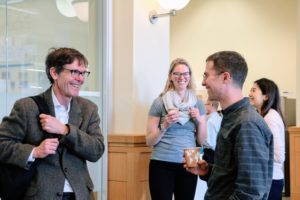
Participants from many campus groups (e.g., LBNL, CSS-IT) were eager to continue the stimulating conversation around data management. Check out the full program and information about the presented topics.
Photographs by Yasmin AlNoamany for the University Library and BIDS.
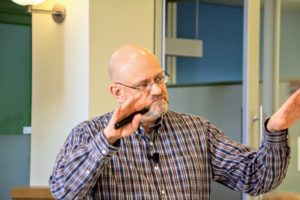
LDW at UC Berkeley was kicked off by a walkthrough and demos about Scopus APIs (Application Programming Interface), was led by Eric Livingston of the publishing company, Elsevier. Elsevier provides a set of APIs that allow users to access the content of journals and books published by Elsevier.
In the first part of the session, Eric provided a quick introduction to APIs and an overview about Elsevier APIs. He illustrated the purposes of different APIs that Elsevier provides such as DirectScience APIs, SciVal API, Engineering Village API, Embase APIs, and Scopus APIs. As mentioned by Eric, anyone can get free access to Elsevier APIs, and the content published by Elsevier under Open Access licenses is fully available. Eric explained that Scopus APIs allow users to access curated abstracts and citation data from all scholarly journals indexed by Scopus, Elsevier’s abstract and citation database. He detailed multiple popular Scopus APIs such as Search API, Abstract Retrieval API, Citation Count API, Citation Overview API, and Serial Title API. Eric also overviewed the amount of data that Scopus database holds.
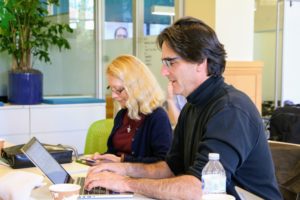
In the second half of the workshop, Eric explained how Scopus APIs work, how to get a key to Scopus APIs, and showed different authentication methods. He walked the group through live queries, showed them how to extract data from API and how to debug queries using the advanced search. He talked about the limitations of the APIs and provided tips and tricks for working with Scopus APIs.

Eric left the attendances with actionable and workable code and scripts to pull and retrieve data from Scopus APIs.
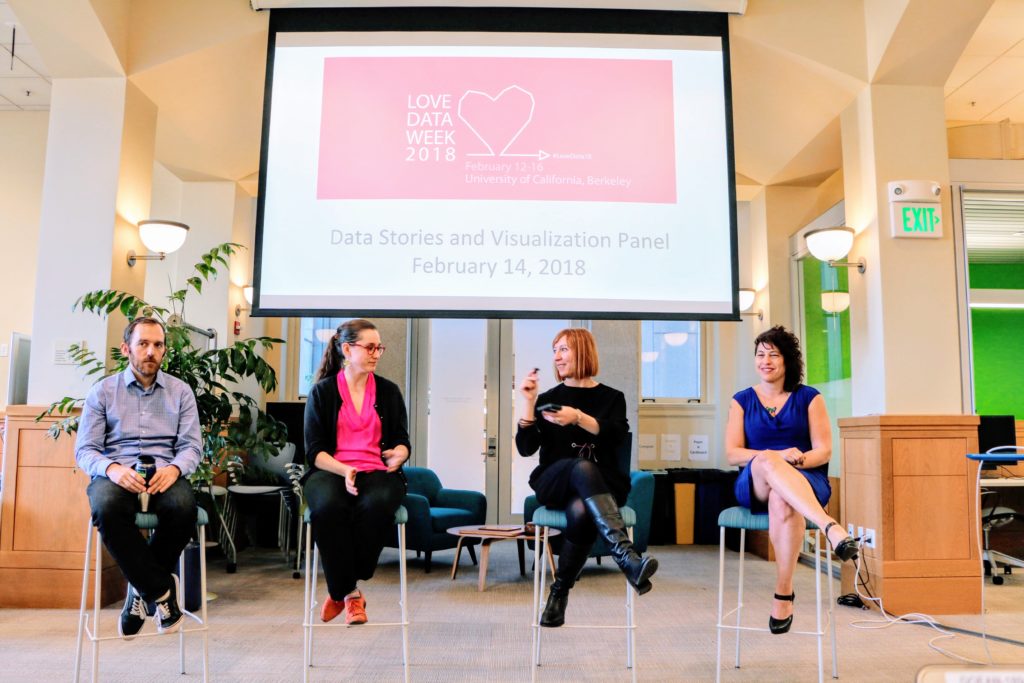
On the second day, we hosted a Data Stories and Visualization Panel, featuring Claudia von Vacano (D-Lab), Garret S. Christensen (BIDS and BITSS), Orianna DeMasi (Computer Science and BIDS), and Rita Lucarelli (Department of Near Eastern Studies). The talks and discussions centered upon how data is being used in creative and compelling ways to tell stories, in addition to rewards and challenges of supporting groundbreaking research when the underlying research data is restricted.
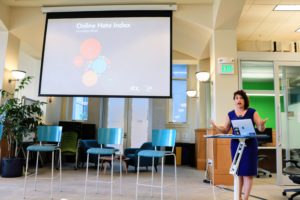
Claudia von Vacano, the Director of D-Lab, discussed the Online Hate Index (OHI), a joint initiative of the Anti-Defamation League’s (ADL) Center for Technology and Society that uses crowd-sourcing and machine learning to develop scalable detection of the growing amount of hate speech within social media. In its recently-completed initial phase, the project focused on training a model based on an unbiased dataset collected from Reddit. Claudia explained the process, from identifying the problem, defining hate speech, and establishing rules for human coding, through building, training, and deploying the machine learning model. Going forward, the project team plans to improve the accuracy of the model and extend it to include other social media platforms.

Next, Garret S. Christensen, BIDS and BITSS fellow, talked about his experience with research data. He started by providing a background about his research, then discussed the challenges he faced in collecting his research data. The main research questions that Garret investigated are: How are people responding to military deaths? Do large numbers of, or high-profile, deaths affect people’s decision to enlist in the military?
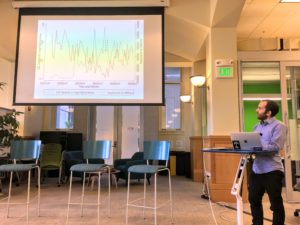
Garret discussed the challenges of obtaining and working with the Department of Defense data obtained through a Freedom of Information Act request for the purpose of researching war deaths and military recruitment. Despite all the challenges that Garret faced and the time he spent on getting the data, he succeeded in putting the data together into a public repository. Now the information on deaths in the US Military from January 1, 1990 to November 11, 2010 that was obtained through Freedom of Information Act request is available on dataverse. At the end, Garret showed that how deaths and recruits have a negative relationship.
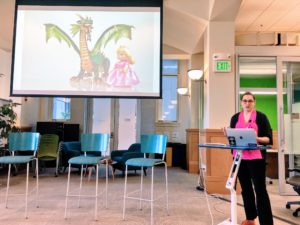
Orianna DeMasi, a graduate student of Computer Science and BIDS Fellow, shared her story of working with human subjects data. The focus of Orianna’s research is on building tools to improve mental healthcare. Orianna framed her story about collecting and working with human subject data as a fairy tale story. She indicated that working with human data makes security and privacy essential. She has learned that it’s easy to get blocked “waiting for data” rather than advancing the project in parallel to collecting or accessing data. At the end, Orianna advised the attendees that “we need to keep our eyes on the big problems and data is only the start.”
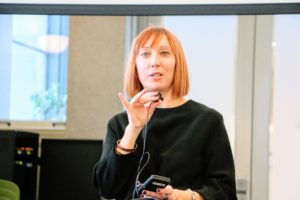
Rita Lucarelli, Department of Near Eastern Studies discussed the Book of the Dead in 3D project, which shows how photogrammetry can help visualization and study of different sets of data within their own physical context. According to Rita, the “Book of the Dead in 3D” project aims in particular to create a database of “annotated” models of the ancient Egyptian coffins of the Hearst Museum, which is radically changing the scholarly approach and study of these inscribed objects, at the same time posing a challenge in relation to data sharing and the publication of the artifacts. Rita indicated that metadata is growing and digital data and digitization are challenging.
It was fascinating to hear about Egyptology and how to visualize 3D ancient objects!

We closed out LDW 2018 at UC Berkeley with a session about Research Data Management Planning and Publishing. In the session, Daniella Lowenberg (University of California Curation Center) started by discussing the reasons to manage, publish, and share research data on both practical and theoretical levels.
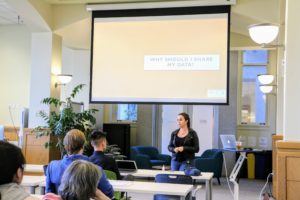
Daniella shared practical tips about why, where, and how to manage research data and prepare it for publishing. She discussed relevant data repositories that UC Berkeley and other entities offer. Daniela also illustrated how to make data reusable, and highlighted the importance of citing research data and how this maximizes the benefit of research.
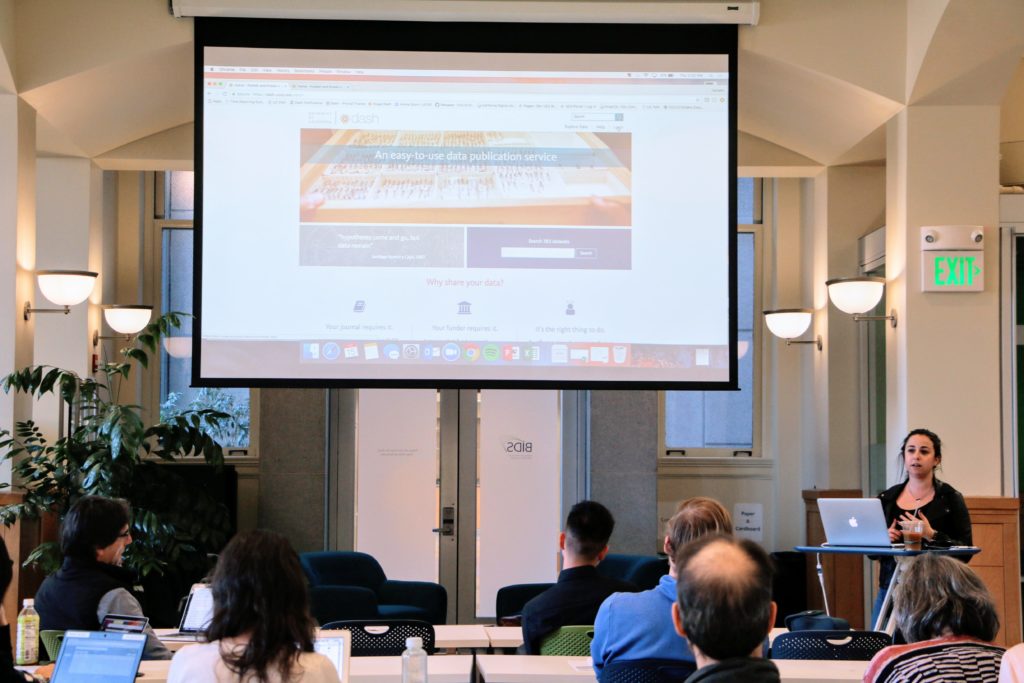
At the end, Daniella presented a live demo on using Dash for publishing research data and encouraged UC Berkeley workshop participants to contact her with any question about data publishing. In a lively debate, researchers shared their experiences with Daniella about working with managing research data and highlighted what has worked and what has proved difficult.
We have received overwhelmingly positive feedback from the attendees. Attendees also expressed their interest in having similar workshops to understand the broader perspectives and skills needed to help researchers manage their data.
I would like to thank BIDS and the University Library for sponsoring the events.
—
Yasmin AlNoamany
From the Oral History Center Director – OHC and Education
For an office that does not offer catalog-listed courses, the Oral History Center is still deeply invested in — and engaged with — the teaching mission of the university.
For over 15 years, our signature educational program has been our annual Advanced Oral History Summer Institute. Started by OHC interviewer emeritus Lisa Rubens in 2002 and now headed up by staff historian Shanna Farrell, this week-long seminar attracts about 40 scholars every year. Past attendees have come from most states in the union and internationally too — from Ireland and South Korea, Argentina and Japan, Australia and Finland. The Summer Institute, applications for which are now being accepted, follows the life cycle of the interview, with individual days devoted to topics such as “Project Planning” and “Analysis and Interpretation.”
In 2015 we launched the Introduction to Oral History Workshop, which was created with the novice oral historian in mind, or individuals who simply wanted to learn a bit more about the methodology but didn’t necessarily have a big project to undertake. Since then, a diverse group of undergraduate students, attorneys, authors, psychologists, genealogists, park rangers, and more have attended the annual workshop. This year’s workshop will be held on Saturday February 3rd and registration is now open.
In addition to these formal, regularly scheduled events, OHC historians and staff often speak to community organizations, local historical societies, student groups, and undergraduate and graduate research seminars. If you’d like to learn more about what we do at the Center and about oral history in general, please drop us a note!

In recent years we have had the opportunity to work closely with a small group of Berkeley undergrads: our student employees. Although the Center has employed students for many decades, only in the past few years have they come to play such an integral role in and make such important contributions to our core activities. Students assist with the production of transcripts, including entering narrator corrections and writing tables of contents; they work alongside David Dunham, our lead technologist, in creating metadata for interviews and editing oral history audio and video; and they partner with interviewers to conduct background research into our narrators and the topics we interview them about. With these contributions, students have helped the Center in very real, measurable ways, most importantly by enabling an increase in productivity: the past few years have been some of the most productive in terms of hours of interviews conducted in the Center’s history. We also like to think that by providing students with intellectually challenging, real-world assignments, we are contributing to their overall educational experience too.
As 2017 draws to a close, I join my Oral History Center colleagues Paul Burnett, David Dunham, Shanna Farrell, and Todd Holmes in thanking our amazing student employees: Aamna Haq, Carla Palassian, Hailie O’Bryan, Maggie Deng (who wrote her first contribution to our newsletter this issue), Nidah Khalid, Pilar Montenegro, Vincent Tran, and Marisa Uribe!
Martin Meeker, Charles B. Faulhaber Director of the Oral History Center
Digital Humanities Grant Opportunities for Art Historians
3D Photogrammetry For Cultural Heritage Workshop
CFP deadline December 1, 2017.
A one-week training workshop (March 25-31, 2018) at UCSC on photogrammetry for early-stage graduate students. Participants in this workshop will gain intensive hands-on experience in the techniques and processing workflow for photogrammetric recording for cultural heritage projects, presented within the context of a critical engagement in discussions of the politics of digital knowledge production. Click here for more information: ARC Photogrammetry Workshop Call UCSC.
Research Project: Ed Ruscha’s “Streets of Los Angeles”
CFP deadline January 19, 2018.
Scholars from a wide range of fields are invited to submit proposals for research projects investigating Ed Ruscha’s “Streets of Los Angeles” archive—including, but not limited to digital humanities, cultural geography, architecture, art history, photography, and visual culture. Interdisciplinary approaches and team-based projects are particularly encouraged. Selected researchers would collaborate with Getty Research Institute (GRI) staff as part of a larger research-technology project, which seeks to digitize and make publicly-accessible a portion of the archive in innovative ways. The goal is to publish resulting scholarship at the close of the project. For more details, click here.
CFP deadline Janurary 5, 2018.
This Getty Foundation supported workshop will support interdisciplinary teams focused on the hard questions of Digital Art History as a discipline, a set of methods, and a host of technical and institutional challenges and opportunities.
Participants will gather from June 4-16, 2018 in Venice, Italy at Venice International University, with follow-up activities taking place over the course of the 2018-19 academic year, and leading into a follow-on gathering in Summer of 2019 that will operate as a writing and digital publication workshop, building upon work done over the course of the year by the project teams and in collaboration with our wider network.
NEH Digital Humanities Advancement Grants
CFP deadline January 16, 2018.
Digital Humanities Advancement Grants (DHAG) support digital projects throughout their lifecycles, from early start-up phases through implementation and long-term sustainability. Experimentation, reuse, and extensibility are hallmarks of this grant category, leading to innovative work that can scale to enhance research, teaching, and public programming in the humanities.
This program is offered twice per year. Proposals are welcome for digital initiatives in any area of the humanities.
Event: Affordable Course Content Workshops
Friday, Dec. 8
Open Textbook Workshop – Faculty & Lecturers
9:30-11:30 a.m. | Academic Innovation Studio, 117 Dwinelle Hall
Are you an instructor who is concerned about the impact of high textbook costs on your students? Are you considering adopting or creating innovative pedagogical materials? Explore possible open textbook solutions by attending a two hour workshop and writing a short textbook review. The Library will provide you with a $200 stipend for your efforts! Space is limited, so please submit a very brief application form:
http://bit.ly/facultyOpenTextwkshp
Friday, Dec. 8
Open Textbook Workshop – Staff & Campus Partners
12:45 p.m. – 2:45 p.m. | Academic Innovation Studio, 117 Dwinelle Hall
Register http://bit.ly/openwkshpcampuspartners
Are you a UC Berkeley staff or affiliate who is concerned about the impact of high textbook costs on students, or you are working with a faculty member who is? Do you want to support the adoption or creation of innovative pedagogical materials? Learn the landscape, opportunities, and challenges for open textbooks, and how to discuss whether open textbooks are a good fit.
Tuesday, Feb. 20
Publish Digital Books and Open Textbooks with Pressbooks
1:10-2:30 p.m. | Academic Innovation Studio, Dwinelle Hall 117 (Level D)
Register http://bit.ly/0220pressbooks
If you’re looking to self-publish work of any length and want an easy-to-use tool that offers a high degree of customization, allows flexibility with publishing formats (EPUB, MOBI, PDF), and provides web-hosting options, Pressbooks may be great for you. Pressbooks is often the tool of choice for academics creating digital books, open textbooks, and open educational resources, since you can license your materials for reuse however you desire. Learn why and how to use Pressbooks for publishing your original books or course materials. You’ll leave the workshop with a project already under way!
Ingenuity Pathway Analysis (IPA) workshop

A representative from Qiagen will offer a hands-on training workshop on using IPA to interpret expression data (including RNA-seq).
You are invited to participate in this free training, and are encouraged to bring your own laptop or use the computer workstations in our training room.
Please register if you are interested in attending.
The workshop will cover how to:
- Format, upload your data, and launch an analysis
- Identify likely pathways that are expressed
- Find causal regulators and their directional effect on gene functions and diseases
- Build pathways, make connections between entities, and overlay multiple datasets on a pathway or network
- Understand the affected biological processes
- Perform a comparison analysis: utilize a heat map to easily visualize trends across multiple time points or samples
Questions? Please contact Elliott Smith (esmith@library.berkeley.edu)
Event: HathiTrust Research Center (HTRC) UnCamp
- Demystifying HathiTrust metadata
- Fair use, copyright, and non-consumptive research
- HathiTrust development, news, and updates
- Digital pedagogy and text analysis curricula
- Scholarly tools and methods for text analysis
- Corpus creation
- Early registration price of $100 through November 29, 2017.
- Standard price of $150 begins on November 30, 2017.
Event: Workshops for faculty and graduate students
Events: 2 Google Workshops (one of them is mine)
 Here are upcoming workshops on Google-related tools. Snacks and soft drinks will be provided.
Here are upcoming workshops on Google-related tools. Snacks and soft drinks will be provided.
Google Search Tips, Tricks and Hacks
October 3 | 4-5 p.m. | 405 Moffitt Library
Refresh your memory on a variety of tricks and strategies to make searching Google, Google Scholar, and all Google’s information products more productive. Taught by Jennifer Dorner and Jesse Silva. (RSVP here)
New Google Sites workshop: Organize, collaborate and share
October 5 | 4-5 p.m. | 405 Moffitt Library
October 16 | 3-4 p.m. | 405 Moffitt Library
Learn how to organize, collaborate, and share online content in the New Google Sites. Sites offers an intuitive drag & drop interface, responsive design, and pre-defined templates. Whether for school, work, play, family, or social, Sites is a simple way to design, manage, and publish a website, wiki, or portfolio, without any prior programing or design skills.Taught by Jen Bellenger and Rob Silva from the bConnected Team. (RSVP here)
Workshops: Digital Publishing
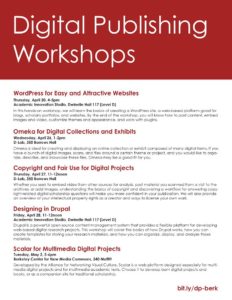 Whether you are looking to create a companion website for your book or a full-scale digital project, this workshop series is designed to get you up and running with the user-friendly, open source web publishing platforms Scalar, WordPress, Omeka and Drupal.
Whether you are looking to create a companion website for your book or a full-scale digital project, this workshop series is designed to get you up and running with the user-friendly, open source web publishing platforms Scalar, WordPress, Omeka and Drupal.
- All platforms are easily managed right through your web browser.
- No programming or coding knowledge is required.
- Options for hosting will be covered.
- Technology workshops will be hands-on; bring a laptop if you can.
This series is designed for faculty, graduate students, and staff in the Humanities and Social Sciences and is open to any member of the UC Berkeley community. Register at bit.ly/dp-berk
WordPress for Easy and Attractive Websites
Thursday, April 20, 4-5pm
Academic Innovation Studio, Dwinelle Hall 117 (Level D)
In this hands-on workshop, we will learn the basics of creating a WordPress site, a web-based platform good for blogs, scholarly portfolios, and websites. By the end of the workshop, you will know how to post content, embed images and video, customize themes and appearance, and work with plugins.
Register
Omeka for Digital Collections and Exhibits
Wednesday, April 26, 1-2pm
D-Lab, 350 Barrows Hall
Omeka is ideal for creating and displaying an online collection or exhibit composed of many digital items. If you have a bunch of digital images, scans, and files around a certain theme or project, and you would like to organize, describe, and showcase these files, Omeka may be a good fit for you. In this hands-on workshop, we will learn how to add and describe items in Omeka, the basics of the Dublin Core metadata schema, and how to create webpages with the Simple Pages plugin.
Register
Copyright and Fair Use for Digital Projects
Thursday, April 27, 11-12noon
D-Lab, 350 Barrows Hall
This training will help you navigate the copyright, fair use, and usage rights of including third-party content in your digital project. Whether you seek to embed video from other sources for analysis, post material you scanned from a visit to the archives, add images, upload documents, or more, understanding the basics of copyright and discovering a workflow for answering copyright-related digital scholarship questions will make you more confident in your publication. We will also provide an overview of your intellectual property rights as a creator and ways to license your own work.
Designing in Drupal
Friday, April 28, 11-12noon
Academic Innovation Studio, Dwinelle Hall 117 (Level D)
Drupal is a powerful open source content management system that provides a flexible platform for developing web-based digital research projects. This workshop will cover the basics of how Drupal works, how you can create templates for storing your research materials, and how you can organize, display, and analyze those materials. Drupal is a good choice for many kinds of projects, including websites and projects underpinned by a database.
Scalar for Multimedia Digital Projects
Tuesday, May 2, 5-6pm
Berkeley Center for New Media Commons, 340 Moffitt
Developed by the Alliance for Networking Visual Culture, Scalar is a web platform designed especially for multimedia digital projects and for multimedia academic texts. Like WordPress, it is easy to create content, but it is distinguished by multiple ways of navigating through a project, annotation and metadata features, and image and video options. Choose it to develop born digital projects and books, or as a companion site for traditional scholarship. In this hands-on workshop, we’ll learn how to create a Scalar project, create pages and media, add metadata and annotations, and define paths.
Register at bit.ly/dp-berk